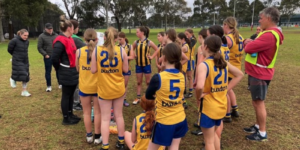Effective Communication: The role of communication in building strong relationships with coaches, teammates, and parents.
By:
Dr. Natalie Flatt (nee McCabe), East Sandringham JFC Chief Mental Health Officer and Mum of 2 Zebbies
Effective communication isn’t just about winning games; it’s about creating strong relationships and nurturing mental well-being. Whether on the field, court, or track, the way we communicate with our coaches, teammates, and parents can profoundly impact our mental health and overall experience.
Why Effective Communication Matters:
Builds Trust and Understanding: Clear and open communication fosters trust and understanding among athletes, coaches, and parents. When everyone feels heard and valued, it strengthens the bond within the team and creates a supportive environment.
Promotes Mental Well-being: Positive communication can boost confidence, reduce stress, and enhance mental resilience. By providing encouragement and constructive feedback, coaches and parents can empower young athletes to overcome challenges and build their self-esteem.
Resolves Conflicts: Conflicts are inevitable in any team setting, but effective communication skills can help resolve them peacefully. Teaching kids how to express their thoughts and emotions respectfully can prevent misunderstandings and promote conflict resolution skills.
Enhances Performance: Clear communication ensures that everyone is on the same page regarding goals, strategies, and expectations. This clarity can improve team cohesion, motivation, and performance on the field.
Tips and Strategies for Parents and Coaches:
Lead by Example: Parents and Coaches serve as role models for young athletes. Demonstrate effective communication by actively listening, providing encouragement and offering constructive feedback. Show empathy and respect in your interactions to set a positive example.
Encourage Open Dialogue: Create a safe and welcoming environment where kids feel comfortable expressing themselves. Encourage open dialogue by asking open-ended questions, actively listening to their concerns, and validating their feelings.
Provide Constructive Feedback: Offer feedback that is specific, constructive, and encouraging. Focus on the effort rather than the outcome and highlight areas for improvement in a supportive manner. Balance constructive criticism with praise to reinforce positive behaviour.
Teach Active Listening: Help kids develop active listening skills by teaching them to pay attention, maintain eye contact, and respond thoughtfully. Encourage them to listen to their teammates’ perspectives and consider different viewpoints.
Promote Positive Self-talk: Emphasise the importance of positive self-talk and self-encouragement. Teach kids to reframe negative thoughts into positive affirmations and to believe in their abilities, even in the face of challenges.
Address Conflict Constructively: Teach kids how to manage conflict effectively by emphasising empathy, active listening, and compromise. Encourage them to communicate their feelings calmly and assertively and to seek mutually beneficial solutions.
Celebrate Achievements: Acknowledge and celebrate both individual and team achievements to boost morale and motivation. Recognise their hard work, progress, and resilience, and highlight their contributions to the team’s success.

